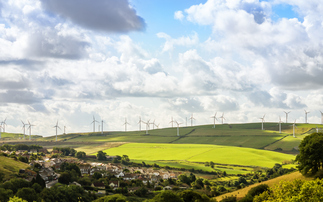Boris Johnson promises a 'clean energy revolution' and the government deserves plaudits for its track record, but credibility is undermined by a refusal to reckon with the Tories' environmental failures
The Cameron-era pledge to lead the 'Greenest Government Ever' always sounded more impressive than it actually was. Unless your plan is to actively increase greenhouse gas emissions and accelerate environmental destruction, then by definition the most recent government should always be able to lay claim to the 'greenest government ever' mantle.
Theresa May's promise to "leave the environment in a better state than we found it" represented a much higher bar, requiring not just an end to environmental degradation but the start of a new era of environmental restoration. As with so many issues, May fell badly short of delivering on her promises.
As Boris Johnson today prepares to make a 'clean energy revolution' a centrepiece of his campaign, it is the tension between these two Conservative promises that will shape how the government's environmental record is judged going into the election.
On the positive side of the ledger, the past nine years of Conservative-led government has delivered a sustained and relatively rapid reduction in carbon emissions (for which the Lib Dems deserve a share of the credit) that stands comparison with any other major economy. Over the same period the UK has also built a genuinely world-leading offshore wind industry inside a decade, while the phase out of coal power - triggered in large part by a Conservative Chancellor and his carbon price floor - has surprised virtually everyone with its world-leading speed and effectiveness. For all May's flaws, her legacy as the first world leader of a major economy to deliver a legally-binding net zero emission target is assured.
There has also been some really impressive and wide-ranging - yet largely under the radar - R&D initiatives focused on how to tackle the next phase of the net zero challenge. From batteries and smart grids to green heat and materials, much of the UK's innovation base has been quietly insulated from the chill winds of Brexit and austerity. It took May's rare gift for political messaging to oversee one of the biggest surges in innovation funding in decades and get precisely zero credit for it.
This is the record Boris Johnson is now seeking to dust off and reinvigorate with a sprinkling of Classical allusions - Promethean spirit of humanity, anyone? - and some post-Brexit buccaneering techno-optimism.
The problem, as yesterday's investigation from the FT and Unearthed (unlikely bedfellows only a few years ago, no?) makes plain, is that there is another side of the green ledger, and it makes for bleak reading for both the government and anyone who cares about the environment.
There are no state secrets contained in this latest assessment of the UK's progress against its various environmental targets, everyone who works in sustainability will be well aware of the various shortfalls. But taken together the litany of failures is still something to behold. The UK is off track to meet targets on air quality, biodiversity, tree-planting, renewables deployment - deep breath - waste-to-landfill, recycling rates, and medium term carbon budgets. This is a non-exhaustive list of environmental policy soft-pedalling.
Worse still for the government, on many of these fronts there are next to no mitigating circumstances. In some cases the targets have been in place for over a decade, it has been clear the UK has not been on track to meet them for years, and there are multiple jurisdictions that provide a clear template for how performance could have been improved. The UK now faces the objectively hysterical prospect (gallows' humour, obviously) of leaving the EU only to enter a transition period and prospective trade deal where it still gets slammed by Brussels for missing the various EU renewables and waste targets it previously agreed to.
Meanwhile, there is worrying evidence that even progress on decarbonisation - the shining emerald light in the government's green progress report - could now be slowing thanks to the bonfire of clean energy policies and energy efficiency funding the government enacted from 2015.
And then there is Brexit. Johnson's claim that getting past Brexit will allow the UK to "unleash" a new wave of clean growth may play well in focus groups, but it is totally detached from reality. There is no 'beyond Brexit' on offer, only ever more interminable trade negotiations. In reality leaving the bloc risks serious economic headwinds and trade barriers - both of which no doubt informed Elon Musk's decision to give the UK a swerve and locate Tesla's new European factory in Germany. With the notable exception of the agricultural sector, there is very little from a climate policy perspective that the UK will be able to do post-Brexit that it cannot do now.
All of which means that on numerous environmental fronts the Conservatives are running on the same unofficial and entirely tacit strapline that is already in place for its various health, education, policing, and Brexit pledges: 'We broke it, now we can fix it'.
Of course, this narrative could still resonate, especially if the government comes forward with a genuinely ambitious net zero strategy that manages to draw a line under the flaws of the May and Cameron government and presents the green economy as a genuine top priority for Johnson.
However, the package of policies trailed to date remains decidedly underpower. Nuclear fusion funding, a new Future Homes Standard, a promised Energy Whitepaper and Transport Decarbonisation Strategy, farming subsidy reforms, £1bn for EV infrastructure, a million more trees - there are all Good Things. But many of them could and should have been delivered five years ago, some of them are simply replacing policies the Conservatives axed, and taken as a whole they do not yet add up to a full spectrum net zero strategy.
Moreover, the tribal refusal to acknowledge that mistakes have been made, that there is a nuanced and balanced assessment to be made of the Party's environmental record, only serves to undermine any claims that the Conservatives are now prepared to deliver a reinvigorated strategy that is truly commensurate to the scale of the climate emergency.
There are plenty of legitimate questions to be asked of the opposition parties' green plans, even before you get into the wider scandal-ridden issues that explain why all but the most tribal of voters find the electoral choices before them next month so utterly dispiriting. But Labour, the Lib Dems, the Greens, and Plaid, and the SNP will all be hoping to get some mileage out of the government's decidedly mixed environmental record. You can see why Number 10 is ducking calls for a TV debate on the climate crisis - the attack lines are obvious, varied, and worst of all for the government, largely justified.
The Conservatives could yet set out a compelling vision for the next decade of environmental progress, and the hope is that Johnson's speech today will start to do just that. But if they are to deliver a truly credible new strategy a good place to start would be owning the mistakes of the past and recognising that the 'greenest government ever' never quite lived up to its promise.
A version of this article originally appeared in the BusinessGreen Overnight Briefing email, which is available to all BusinessGreen subscribers.









